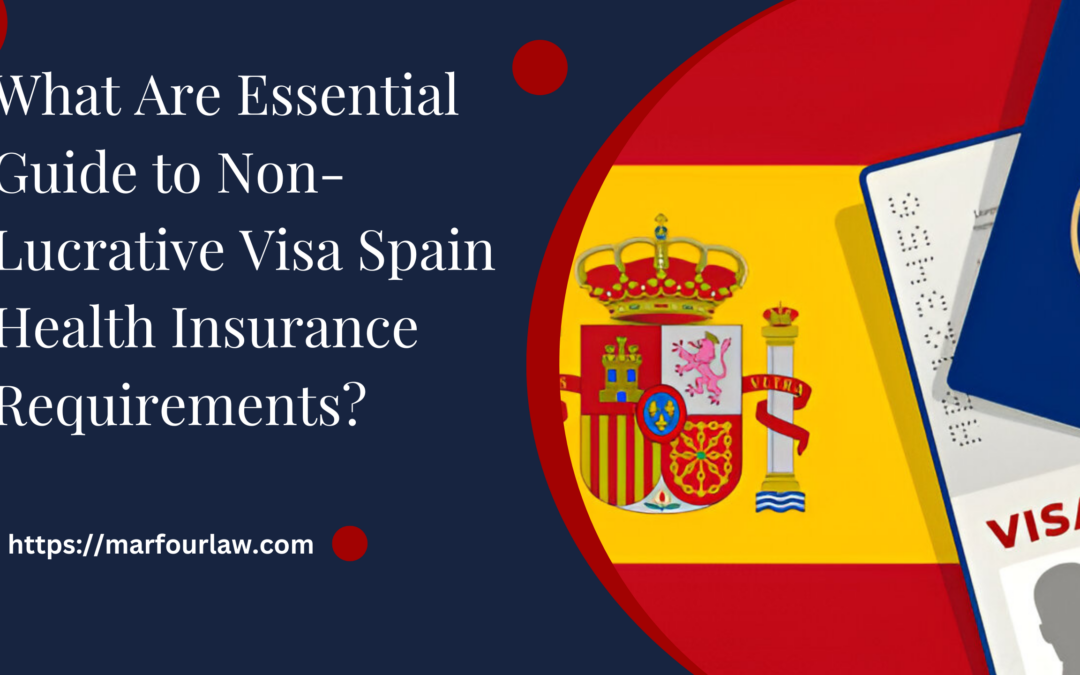When applying for a Non-Lucrative Visa Spain Health Insurance is a crucial aspect of your application. This visa allows you to live in Spain without working, meaning you must show that you can financially support yourself and have adequate health coverage. In this blog, we will dive into the specifics of health insurance for the Non-Lucrative Visa Spain, addressing key aspects that applicants need to know.
What is the Non-Lucrative Visa Spain?
The Non-Lucrative Visa is designed for non-EU nationals who wish to reside in Spain without engaging in any work-related activities. This visa is popular among retirees and individuals seeking a long-term stay in Spain without the obligation to work. To qualify, applicants must prove they have sufficient financial means to support themselves and must have valid health insurance coverage.
Financial Requirements for the Non-Lucrative Visa
To qualify for the Non-Lucrative Visa, applicants must demonstrate that they have enough financial resources to support themselves. The exact amount varies, but as a guideline, the minimum required income is generally set at 400% of the IPREM (Public Multiple Effects Income Indicator) per year. For 2024, this amount is approximately €27,000. Proof can include bank statements, pension funds, or other sources of income.
Importance of Non-Lucrative Visa Spain Health Insurance
When applying for a Non-Lucrative Visa Spain, one of the essential requirements is having adequate health insurance. This requirement isn’t just a bureaucratic formality; it plays a crucial role in ensuring that you, as a resident, have access to necessary medical care during your stay. Here’s why health insurance is vital for your non-lucrative visa.

Compliance with Visa Requirements
First and foremost, having health insurance is a legal requirement for obtaining a non-lucrative visa. The Spanish authorities want to ensure that all residents can access healthcare services without burdening the public system. By securing private health insurance, you demonstrate your commitment to fulfilling this obligation, which is a key part of the application process.
Access to Quality Healthcare
With health insurance, you gain access to a broad network of healthcare providers and facilities in Spain. This means you can choose from various doctors, specialists, and hospitals, ensuring you receive quality medical care when you need it. Unlike the public healthcare system, private insurance often provides shorter wait times and more personalized attention.
Comprehensive Coverage
Health insurance for non-lucrative visa holders typically includes a range of services. These may cover general practitioner visits, specialist consultations, hospitalization, diagnostic tests, and even emergency services. This comprehensive coverage helps you manage health issues without worrying about high out-of-pocket costs. Knowing you have financial support for medical emergencies can provide peace of mind while living abroad.
Avoiding Out-of-Pocket Expenses
Healthcare costs in Spain can add up, especially without insurance. If you require medical attention, you could face significant bills. Having health insurance protects you from these unexpected expenses, allowing you to focus on your health and well-being rather than financial stress. It acts as a safety net, ensuring you can receive care without worrying about how to pay for it.
Ensuring Peace of Mind
Moving to a new country can be exciting yet stressful. Having reliable health insurance adds a layer of security to your experience in Spain. You can enjoy your new surroundings, explore, and immerse yourself in the culture, knowing you have health coverage to rely on in case of illness or injury. This peace of mind enhances your overall quality of life while living in Spain.
Supporting Your Long-Term Stay
Health insurance isn’t just essential for your initial application; it’s also crucial for maintaining your non-lucrative visa status. If you fail to keep your health insurance policy active or switch to a plan that doesn’t meet the requirements, you risk complications during your visa renewal process. Staying compliant with your health insurance ensures your residency status remains secure.
Types of Health Insurance Policies Available in Spain
When considering health insurance in Spain, it’s essential to understand the various types of policies available. Each type offers different levels of coverage and benefits to cater to the diverse needs of residents. Here’s a breakdown of the primary types of health insurance policies you can choose from.

Public Healthcare System
While this isn’t a traditional insurance policy, Spain’s public healthcare system is an option for residents, especially if they meet specific requirements. Here are the key points:
- Eligibility: Spanish citizens and residents with legal status can access public healthcare services. This is particularly beneficial for those working or contributing to the social security system.
- Cost: Public healthcare is funded through taxes, so there are generally no direct costs for services at the point of use. However, some services, like dental care and certain specialized treatments, may not be fully covered.
- Services: The public system provides a wide range of services, including general practitioner visits, hospital care, emergency services, and some preventive care.
Private Health Insurance
Many expats and residents in Spain choose private health insurance for its advantages over the public system. Here are the main types of private health insurance policies:
Full Health Insurance
This type of policy offers comprehensive coverage for a wide range of medical services, ensuring that you receive quality care without worrying about high costs.
- Benefits: Coverage includes general practitioner visits, specialist consultations, hospital stays, surgeries, diagnostic tests, and emergency services.
- Network: You usually have access to a broad network of healthcare providers, which allows for more choices when seeking medical care.
- Flexibility: Full health insurance policies often allow for shorter wait times and more immediate access to specialists.
Basic Health Insurance
For those on a budget, basic health insurance policies provide essential coverage at a lower premium.
- Benefits: Typically includes primary care and some specialized services, but may exclude certain treatments and procedures.
- Cost-Effective: Ideal for individuals who primarily need routine medical care and are willing to pay out-of-pocket for more extensive treatments.
- Limitations: While it offers a safety net, it may not cover everything you need, so it’s essential to review the policy details carefully.
Dental Insurance
Dental health is an important aspect of overall well-being, and dental insurance is a separate policy often available to complement health insurance.
- Coverage: Includes routine check-ups, cleanings, and some dental procedures like fillings, crowns, and orthodontics.
- Options: You can typically add dental coverage to your existing health insurance policy or purchase it as a standalone plan.
Travel Health Insurance
If you plan to travel frequently within Spain or to other countries, travel health insurance can provide additional peace of mind.
- Benefits: Covers medical emergencies while traveling, including hospital stays, medical evacuations, and sometimes even trip cancellations due to health issues.
- Short-Term Coverage: This type of insurance is often designed for short-term trips rather than long-term residency.
International Health Insurance
For those who divide their time between Spain and another country or who want coverage that extends beyond Spanish borders, international health insurance is a suitable choice.
- Global Coverage: This policy often provides access to a network of healthcare providers worldwide, ensuring you’re covered no matter where you are.
- Comprehensive Services: Typically includes extensive coverage for various medical services, similar to full health insurance, but with the added benefit of international access.
Choosing the right health insurance policy in Spain is crucial for ensuring you have access to the care you need. Whether you opt for public healthcare or select a private insurance plan, understanding the types of policies available will help you make an informed decision that fits your lifestyle and budget. If you have questions about health insurance options or need assistance with your non-lucrative visa application, the team at Marfour International Law Firm is here to help you every step of the way!
How Do You Say Insurance in Spanish?
When learning a new language, it’s essential to grasp the basic vocabulary, and “insurance” is a term you’ll likely encounter frequently, especially in contexts related to health, travel, and property. In Spanish, the word for insurance is “seguro.”

Definition of “Seguro”
The term “seguro” in Spanish refers to any type of insurance policy that offers protection or coverage against specific risks. This can encompass various kinds of insurance, such as:
- Health Insurance: Refers to “seguro de salud,” which provides medical coverage.
- Car Insurance: Known as “seguro de coche” or “seguro de automóvil,” it protects against damages related to vehicles.
- Home Insurance: This is called “seguro de hogar,” which covers property against damages or losses.
Usage in Sentences
Understanding how to use “seguro” in sentences can help you communicate effectively. Here are a few examples:
- Tengo un seguro de salud.
- (I have health insurance.)
- Es importante tener un seguro de coche.
- (It’s important to have car insurance.)
- El seguro de hogar cubre incendios y robos.
- (Home insurance covers fires and theft.)
Related Vocabulary
Familiarizing yourself with related terms can be beneficial:
- Aseguradora: This means “insurance company.”
- Póliza: This refers to the “policy” or the document that outlines the terms of the insurance coverage.
- Cobertura: This translates to “coverage,” indicating what is included in the insurance plan.
In summary, the word for insurance in Spanish is “seguro.” This term is widely used in various contexts, making it a vital part of the language, especially for anyone dealing with health, travel, or property matters in Spanish-speaking countries. Familiarizing yourself with its usage and related terms can enhance your communication skills and overall understanding of insurance-related discussions.
FAQs
What is the minimum coverage required for health insurance when applying for a Non-Lucrative Visa Spain?
To meet the requirements for a Non-Lucrative Visa, your health insurance must provide comprehensive coverage, including hospitalization, emergency services, and outpatient care. The policy should not have waiting periods for pre-existing conditions and must be valid for the duration of your stay in Spain.
Can I include my family members in my Non-Lucrative Visa health insurance policy?
Yes, you can include your family members in your health insurance policy when applying for a Non-Lucrative Visa. It is essential to ensure that each family member is covered under the same insurance plan or has their own separate policy that meets the visa requirements.
How do I choose the right health insurance provider for my Non-Lucrative Visa?
When selecting a health insurance provider for your Non-Lucrative Visa, consider factors such as coverage options, premium costs, customer reviews, and the insurer’s reputation. Make sure the provider is recognized in Spain and that the policy meets all visa requirements, including comprehensive coverage without waiting periods.
Conclusion
Securing proper Non-Lucrative Visa Spain Health Insurance is a key step in your visa application process. It’s not only a legal requirement but also an essential part of ensuring your health and safety while living in Spain. By choosing the right policy that meets Spanish regulations, you can enjoy your stay in this beautiful country without worrying about medical expenses. Remember to compare various insurance options and read the terms carefully to find the best coverage for your needs.

